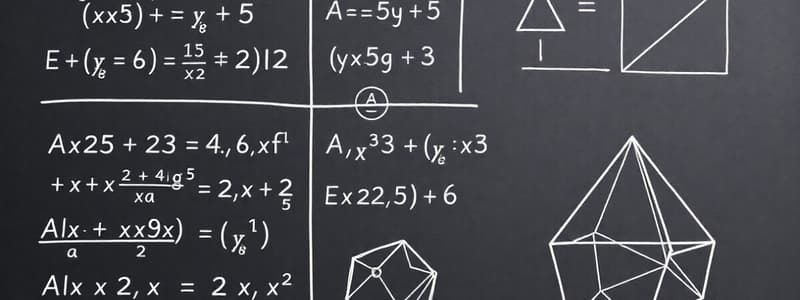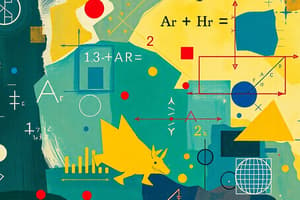Podcast
Questions and Answers
What is the definition of axioms?
What is the definition of axioms?
- Statements that are proven using theorems.
- Logical conclusions drawn from established premises.
- Fundamental assumptions accepted as true without proof. (correct)
- Propositions that derive from observations.
Which statement describes corollaries?
Which statement describes corollaries?
- Theorems that follow directly from other theorems. (correct)
- Generalizations made from observations and patterns.
- Proved propositions that serve as foundations for new theorems.
- Basic assumptions that do not require proof.
What does inductive reasoning involve?
What does inductive reasoning involve?
- Verifying the validity of proposed solutions.
- Drawing conclusions based on logical steps.
- Creating generalizations based on observed patterns. (correct)
- Decomposing large problems into smaller parts.
Which of the following is NOT a problem-solving strategy?
Which of the following is NOT a problem-solving strategy?
What does visualisation in problem-solving involve?
What does visualisation in problem-solving involve?
What does arithmetic primarily involve?
What does arithmetic primarily involve?
Which of the following branches of mathematics includes the study of limits and derivatives?
Which of the following branches of mathematics includes the study of limits and derivatives?
What is a characteristic of irrational numbers?
What is a characteristic of irrational numbers?
Which of the following represents all the rational and irrational numbers?
Which of the following represents all the rational and irrational numbers?
What is the term for the repeated multiplication of a number?
What is the term for the repeated multiplication of a number?
Which operation finds how many times one value is contained within another?
Which operation finds how many times one value is contained within another?
What do proofs in mathematics demonstrate?
What do proofs in mathematics demonstrate?
Which number system includes both negative and positive integers?
Which number system includes both negative and positive integers?
Flashcards
Axioms
Axioms
Fundamental assumptions considered true without proof, forming the foundation of a theory.
Theorems
Theorems
Propositions proven using axioms and other established theorems.
Corollaries
Corollaries
Theorems that directly follow from other proven theorems.
Deductive Reasoning
Deductive Reasoning
Signup and view all the flashcards
Inductive Reasoning
Inductive Reasoning
Signup and view all the flashcards
What is Arithmetic?
What is Arithmetic?
Signup and view all the flashcards
What is Algebra?
What is Algebra?
Signup and view all the flashcards
What is Geometry?
What is Geometry?
Signup and view all the flashcards
What is Calculus?
What is Calculus?
Signup and view all the flashcards
What are Natural Numbers?
What are Natural Numbers?
Signup and view all the flashcards
What are Integers?
What are Integers?
Signup and view all the flashcards
What are Rational Numbers?
What are Rational Numbers?
Signup and view all the flashcards
What are Irrational Numbers?
What are Irrational Numbers?
Signup and view all the flashcards
Study Notes
Introduction to Mathematics
- Mathematics is a fundamental field of study encompassing a broad range of concepts, principles, and techniques used to quantify, model, and analyze the world around us.
- It encompasses various branches including arithmetic, algebra, geometry, calculus, and more.
- It uses symbolic language and logical reasoning to establish relationships between mathematical objects.
- Mathematics is essential in many fields, including science, engineering, computer science, and economics.
Key Branches and Concepts
-
Arithmetic: Deals with basic operations like addition, subtraction, multiplication, and division on numbers. Covers concepts such as place value, fractions, decimals, and percentages.
-
Algebra: Introduces variables and equations to represent and solve problems. Includes linear equations, quadratic equations, systems of equations, and inequalities.
-
Geometry: Focuses on shapes, sizes, positions, and relationships of objects in space. Includes plane geometry (2D) and solid geometry (3D), exploring concepts like lines, angles, triangles, circles, and volumes.
-
Calculus: Concerned with continuous change and differentiation and integration. It involves limits, derivatives, integrals, and applications in areas such as optimization, motion, and modeling.
Number Systems
- Natural Numbers: Counting numbers (1, 2, 3,...).
- Whole Numbers: Natural numbers plus zero (0, 1, 2, 3,...).
- Integers: Whole numbers and their negative counterparts (... -3, -2, -1, 0, 1, 2, 3,...).
- Rational Numbers: Numbers that can be expressed as a fraction p/q, where p and q are integers and q is not zero.
- Irrational Numbers: Numbers that cannot be expressed as a fraction and their decimal representations are non-repeating and non-terminating.
- Real Numbers: All rational and irrational numbers. Includes both algebraic and transcendental numbers.
- Complex Numbers: Numbers that include the imaginary unit 'i', where i² = -1.
Fundamental Operations
- Addition: Combining values.
- Subtraction: Finding the difference between values.
- Multiplication: Repeated addition.
- Division: Finding how many times one value is contained within another.
- Exponents: Repeated multiplication.
- Roots: Opposite of exponents.
Mathematical Reasoning and Logic
- Proofs: Demonstrating the truth of a mathematical statement.
- Axioms: Fundamental assumptions or statements that are accepted as true without further proof.
- Theorems: Propositions that are proved based on axioms and other theorems.
- Corollaries: Theorems that readily follow from other theorems.
- Deductive Reasoning: Using logical steps to draw conclusions from given premises.
- Inductive Reasoning: Observing patterns and making generalizations.
Problem-Solving Strategies
- Identifying Key Information: Focusing on the relevant details of a problem.
- Formulating Equations: Representing problems using mathematical symbols and variables.
- Visualisation: Creating diagrams or models to represent the problem.
- Breaking Down Complex Problems: Decomposing large problems into smaller, manageable parts.
- Testing Solutions: Verifying the validity of proposed solutions.
Studying That Suits You
Use AI to generate personalized quizzes and flashcards to suit your learning preferences.




